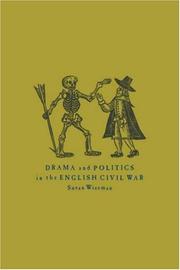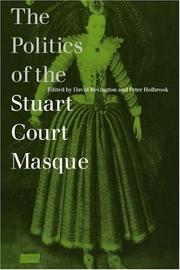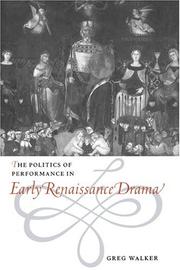| Listing 1 - 3 of 3 |
Sort by
|

ISBN: 0521472210 9780521032452 0521032458 9780521472210 9780511518980 0511518986 Year: 1998 Publisher: Cambridge : Cambridge university press,
Abstract | Keywords | Export | Availability | Bookmark
 Loading...
Loading...Choose an application
- Reference Manager
- EndNote
- RefWorks (Direct export to RefWorks)
In 1642 an ordinance closed the theatres of England. Critics and historians have assumed that the edict was to be firm and inviolate. Susan Wiseman challenges this assumption and argues that the period 1640 to 1660 was not a gap in the production and performance of drama nor a blank space between 'Renaissance drama' and the 'Restoration stage'. Rather, throughout the period, writers focused instead on a range of dramas with political perspectives, from republican to royalist. This group included the short pamphlet dramas of the 1640s and the texts produced by the writers of the 1650s, such as William Davenant, Margaret Cavendish and James Shirley. In analysing the diverse forms of dramatic production of the 1640s and 1650s, Wiseman reveals the political and generic diversity produced by the changes in dramatic production, and offers insights into the theatre of the Civil War.
English literature --- Drama --- anno 1600-1699 --- Thematology --- English drama --- Literary form --- Political plays, English --- Politics and literature --- Theater --- History and criticism. --- History --- Political aspects --- Arts and Humanities --- Literature --- Great Britain --- Literature and the revolution. --- Literature and the war. --- Dramatics --- Histrionics --- Professional theater --- Stage --- Theatre --- Performing arts --- Acting --- Actors

ISBN: 0521594367 0521031206 9780521031202 9780521594363 Year: 1998 Publisher: Cambridge Cambridge University Press
Abstract | Keywords | Export | Availability | Bookmark
 Loading...
Loading...Choose an application
- Reference Manager
- EndNote
- RefWorks (Direct export to RefWorks)
English drama --- Masques, English --- Political plays, English --- Politics and literature --- Theater --- Dramatics --- Histrionics --- Professional theater --- Stage --- Theatre --- Performing arts --- Acting --- Actors --- History and criticism --- History --- Political aspects --- Great Britain --- Court and courtiers --- Politics and government --- Drama --- English literature --- anno 1500-1599 --- anno 1600-1699

ISBN: 051158315X 0511005113 9780511005114 9780511583155 0521563313 9780521563314 9780521029919 0521029910 9780521029919 Year: 1998 Publisher: Cambridge : Cambridge University Press,
Abstract | Keywords | Export | Availability | Bookmark
 Loading...
Loading...Choose an application
- Reference Manager
- EndNote
- RefWorks (Direct export to RefWorks)
Greg Walker provides a new account of the relationship between politics and drama in the turbulent period from the accession of Henry VIII to the reign of Elizabeth I. Building upon ideas first developed in Plays of Persuasion (1991), he focuses on political drama in both England and Scotland, exploring the complex relationships between politics, court culture and dramatic composition, performance and publication. Through a detailed analysis of one central dramatic form, the interlude or great hall play, and close study of key texts, Walker examines drama produced and adapted for varying conditions of performance: indoor and outdoor, private and public. He examines what happened when the play script was printed and sold commercially as a literary commodity. This interdisciplinary analysis will find a market among Tudor historians as well as students of medieval and Renaissance drama.
Political and social views. --- English drama --- Theater --- Politics and literature --- Political plays, English --- Renaissance --- History and criticism. --- Political aspects --- History --- Lindsay, David, --- Heywood, John, --- Udall, Nicholas, --- Norton, Thomas, --- Great Britain --- Politics and government --- Dramatics --- Histrionics --- Professional theater --- Stage --- Theatre --- Performing arts --- Acting --- Actors --- Revival of letters --- Civilization --- History, Modern --- Civilization, Medieval --- Civilization, Modern --- Humanism --- Middle Ages --- Heywoode, John, --- Heiwood, John, --- Heywoode, Jhon, --- Heywood, J. --- Haywood, John, --- Haywoode, John, --- Heywod, John, --- Arts and Humanities --- Literature
| Listing 1 - 3 of 3 |
Sort by
|

 Search
Search Feedback
Feedback About UniCat
About UniCat  Help
Help News
News